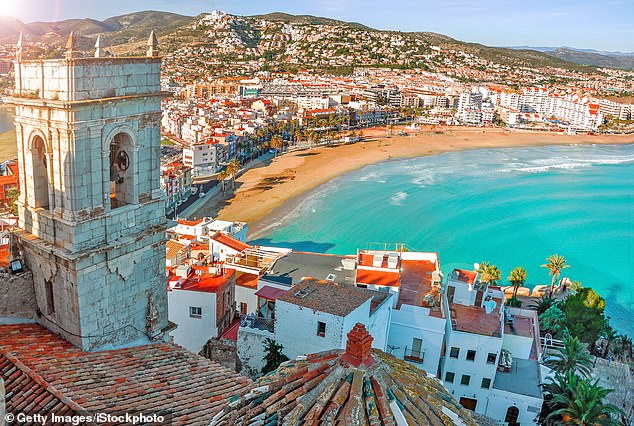How much does it really cost to retire to Spain? Everything you need to know before taking the leap (and it’s less money than you might think!)

Every Sunday, Lynne Eyre-Bower heads to a pub in her Valencian town for lunch with friends. She moved to a working town rather than a beach resort to experience an authentic Spanish lifestyle, yet once a week she loves to catch up over a British-style Sunday roast for the princely sum of €13.
After two years of living in Catral after being priced out of Cornwall, she’s fluent in Spanish, has Spanish neighbours and feels settled, says the 65-year-old, who shares her home with her cocker spaniel, Lily, and two cats.
In Cornwall, the average house price is £296,000, and the average (Band D) council tax £2,221 per year. Lynne, above, bought her Spanish three-bed home for €75,000 (£64,000) and her SUMA (local tax) is just €82 per year.

Lynne Eyre-Bower, left, enjoying her Spanish retirement with three of her friends: Jan, Lesley and Marion

Spain is our top choice for a cheap life in the sun. Around 130,000 British over-60s live there

The Turia fountain in Valencia. According to website Numbeo, the cost of living in Spain is 23 per cent lower than in the UK
She’s far from alone in relocating to Spain for the lower cost of living, with the added bonus of 300 days’ sunshine a year. More affordable than the Costa del Sol, her province of Alicante is the most popular for Britons, with 76,739 living there in 2023, according to the local census. Alicante, as indeed most of the Spanish mainland, has experienced none of the recent ‘anti-tourism’ demonstrations that have been seen on the Balearic and Canary Islands where housing affordability for locals is the root of the tensions. ‘It’s great being able to sit outside for coffee, or in friends’ gardens,’ says Lynne, who opted not to have her own swimming pool to cut down on energy costs. ‘Life is more relaxed here and I can live well within my means.’
According to website Numbeo, the cost of living in Spain is 23 per cent lower than in the UK, with a single person able to live on £600 a month, bar rent or mortgage.
Spain is our top choice for a cheap life in the sun. Around 130,000 British over-60s live there and the UK’s cost-of-living crisis remains a big driver, despite price hikes on some Spanish goods. Lynne’s weekly supermarket shop is around €100 – up from €80 two years ago – and the cost of a litre of olive oil at €8.50 in Spain is similar to UK supermarkets, but the €2.50 Lynne pays for the glass of wine with her Sunday lunch that would cost £5-7 in a Cornish pub has changed little.
At local restaurants, a menu del dia (menu of the day) – with cheese and cured meat appetiser, then grilled hake or paella and a dessert with half a bottle of wine and a coffee – has gone up from €10 to €12 in the past two years.
When Lynne reaches 66, she will get her UK state pension, although after working for 23 years she will not get the full £221 per week, but around £130-140. But the British Telecom pension she already draws is three times the sum Numbeo suggests is needed in Spain – while nowhere near the £43,100 required for a pensioner to enjoy a comfortable UK retirement, according to The Pensions and Lifetime Savings Association, or even the £31,300 a year for a ‘moderate’ lifestyle.
Later-life perks

When Lynne, pictured left with her friends Nicki and Jan, reaches 66, she will get her UK state pension. The Spanish government also offers perks to pensioners – both Spanish-born and Britons who’ve taken residency
The Spanish government offers perks to pensioners – both Spanish-born and Britons who’ve taken residency – such as discounted holidays, via their town hall or a government website. ‘Friends in my lunch group regularly enjoy all-inclusive holidays to Tenerife, Majorca and Almeria for €200-€300 per trip,’ says Lynne.
Retirees in the Canary Islands can also enjoy cheaper ferry fares between the islands, as well as resident discounts of up to 75 per cent on domestic flights.
In Andalusia, the over-65s can get a ‘Card 65’ which gives them discounts on buses, spectacles, hearing aids and hotels.
40 per cent lower bills

Lynne’s monthly electricity bill is €64-65, a little less than the £80 UK average. This leaves more to spend on treats such as eating out
After three years of government energy subsidies, inflation in Spain this April was actually higher than a year ago. But while energy costs are up across Europe, the combined cost of utilities in Spain – electricity, heating, cooling, water and waste disposal – is 40 per cent cheaper than the UK.
Lynne’s monthly electricity bill is €64-65 – a little less than the £80 UK average, according to Ofgem.
One of the government deductions was on petrol, and Lynne says she pays €1.54-1.96 per litre for unleaded petrol. Here it’s £1.45p per litre, according to the AA.
To keep car costs down, Lynne has a ‘cheap-to-run’ Suzuki Alto car, for which car tax is €100 a year and insurance €308, including the mandatory state breakdown/pick-up cover. She pays €289 a year for house insurance but along with the hefty saving on her council tax (€82 per year), water bills are only €40 a year. The average UK water bill in 2023/24 was £448, says regulator Ofwat. She pays just €48 a month for her landline/broadband/mobile package.
Reasonable vet bills
Keeping Lily, her dog, is not exorbitant either. ‘I pay only €12 per night for putting Lily in a kennel. In Cornwall, it’s around £20 per night, in other parts of the UK can be up to £45,’ explains Lynne.
‘When Lily ate a coffee capsule she needed injections, an X-ray plus pills for five days and it came to €110,’ she added.
Ready for when she hits UK state pension age, Lynne has applied for a S1 certificate (from NHS Business Services) that will let her pay less for prescriptions and access free primary healthcare. Until then, she pays €1,500 a year for private healthcare – a necessary condition of her residency – via the Non-Lucrative Visa.
Tax considerations

If you keep your UK property you could get stung for Spanish capital gains tax once you emigrate, says Kelman Chambers of Blevins Franks
Advisers urge people to start financial planning 18 months before becoming tax resident in Spain. If you keep your UK property you could get stung for Spanish capital gains tax once you emigrate, says Kelman Chambers, of Blevins Franks, a specialist cross-border financial adviser.
‘You will pay 20-25 per cent tax on the gain, unless you are over 65 and you sell it within two years of it ceasing to be your main residence; or if you invest all of the proceeds in a new main residence [in Spain].’
So the CGT on a £500,000 gain on a house (bought for £100,000 but sold for £600,000) would be €127,880, at the €1.17 exchange rate at the time of writing.
According to Mr Chambers, income from a UK buy-to-let property would first be taxed (or assessed for tax) in the UK, then assessed in Spain.
‘While there is a double tax agreement in place, it means you won’t pay tax twice on the same income, but you would pay the equivalent of the higher of the two bills.’
State pensions and private pensions come under ‘general income’ and are taxed at standard income tax rates of 19-47 per cent. The double taxation agreement with Spain means you won’t also be taxed in the UK – but you would need to inform HMRC and get an NT tax code to let your pension providers pay your pension gross.
There is no ‘tax-free lump sum’ in Spain. If you have not moved yet and want a lump sum, taking it while you are still a UK resident will save you tax. If you have a Crown pension (government service) these remain taxable in the UK but are not taxed in Spain.
Investment issues

Red tape aside, Lynne has no plans to return to her old village near Looe. She says of Spain: ‘It’s a warmer, more welcoming place where children cherish their parents and old people are well cared for’
As well as income tax, Spain imposes wealth tax on residents’ worldwide assets, including investments, buy-to-let income, pensions, dividends and gambling wins.
Retirees with significant assets outside Spain should seek advice on managing their tax exposure, advises Mark Routen, Head of Tax at Hoxton Capital Management, who warns: ‘Expats could remain liable to UK inheritance tax on worldwide assets even if they are tax resident in Spain.’
The most common mistake you can make is thinking your tax-efficient planning in the UK will work in Spain, such as keeping ISAs and premium bonds, as they are taxable in Spain, regardless of where they are held/invested, cautions Mr Chambers.
‘Don’t become tax resident with a portfolio of ISAs and other investments,’ he warned.
Red tape aside, Lynne has no plans to return to her old village near Looe. She says of Spain: ‘It’s a warmer, more welcoming place where children cherish their parents and old people are well cared for.
‘I miss my Cornish friends and how green it is, plus that you can go on long walks in the summer – but I simply can’t afford to move back to the UK.’
Some links in this article may be affiliate links. If you click on them we may earn a small commission. That helps us fund This Is Money, and keep it free to use. We do not write articles to promote products. We do not allow any commercial relationship to affect our editorial independence.






